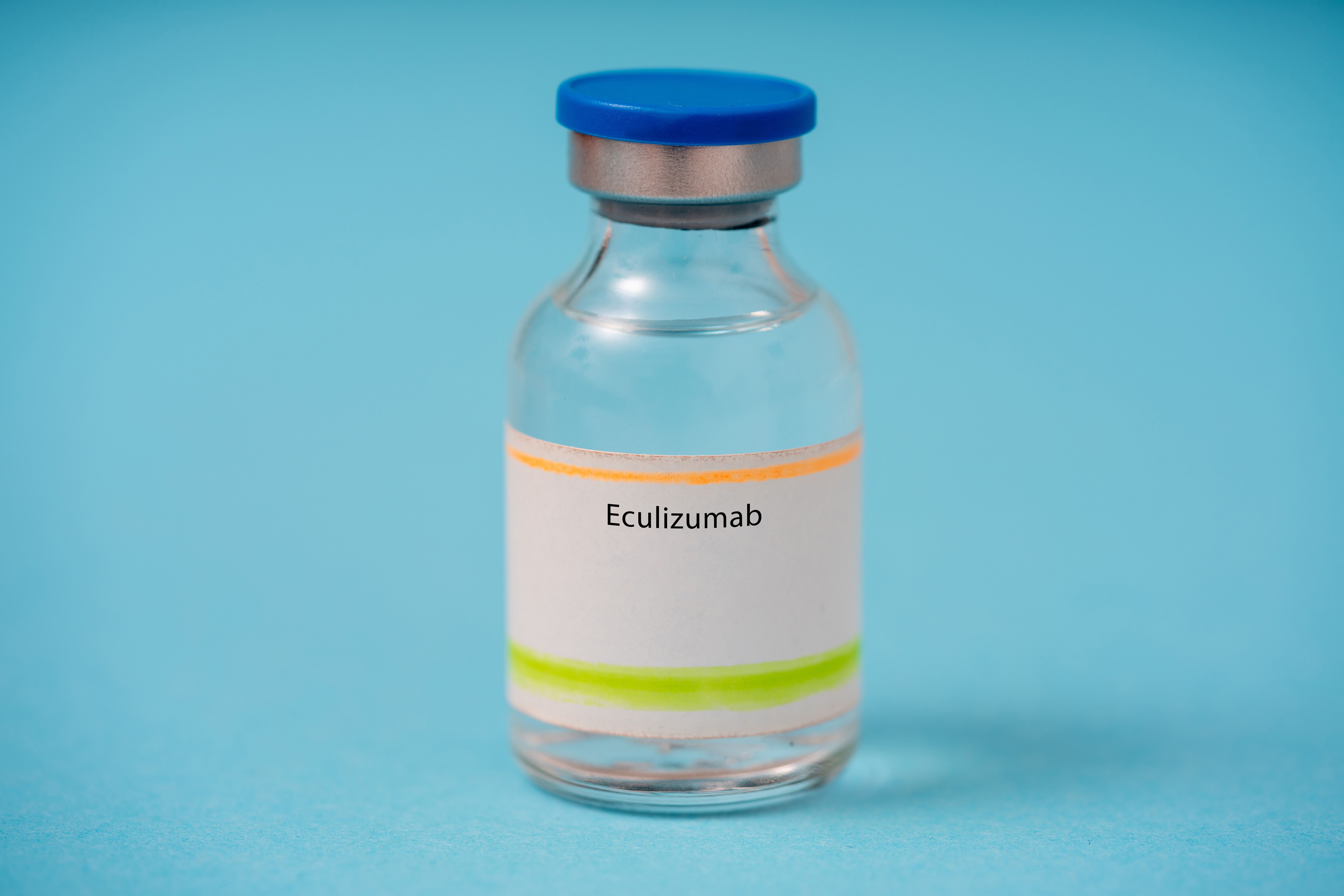- Center on Health Equity & Access
- Clinical
- Health Care Cost
- Health Care Delivery
- Insurance
- Policy
- Technology
- Value-Based Care
Complement Inhibitors Suggested to Benefit Treatment Outcomes in PNH
A meta-analysis on complement inhibitors in the management of paroxysmal nocturnal hemoglobinuria (PNH) reveals an association between these interventions and positive treatment outcomes.
Complement inhibitors have demonstrated great promise in the treatment and long-term management of paroxysmal nocturnal hemoglobinuria (PNH), according to a study published in Therapeutic Advances in Hematology.
Eculizumab Bottle | image credit: luchschenF - stock.adobe.com

Those affected by PNH experience hemolytic events, dysfunction in their bone marrow, and carry a mutation to their phosphatidylinositol glycan anchor biosynthesis class A (PIGA) gene that causes thrombosis. Complement inhibitors such as pegcetacoplan, ravulizumab, and eculizumab have dramatically altered the landscape of care for impacted patients. Prior to their introduction over the last 17 years, treatment approaches included blood transfusions, bone marrow transplants, and more that put patients with PNH at risk for mortality.
The authors of the current study speculate that the rarity of PNH has contributed to a lack of critical data on the short- and long-term efficacy of these treatments. To address this gap, researchers conducted a meta-analysis and systematic review of PNH-approved complement inhibitors to unearth efficacy data that could help inform clinical decisions.
Data were gathered from the Cochrane Registry of Clinical Trials (CENTRAL), MEDLINE, and EMBASE databases from their inception until March 2023. No retrospective, observational, in vitro, or in vivo studies were included. Changes in hemoglobin (Hb), lactate dehydrogenase (LDH) levels, and transfusion avoidance were assessed to measure treatment responses. Furthermore, researchers examined scores from the Functional Assessment of Chronic Illness Therapy Fatigue (FACIT-F), a 13-item questionnaire that measures the effect of fatigue on patients’ quality of life (scores 0-52; higher scores signify less fatigue).
After screening for eligible reports, 16 clinical trials involving 912 patients with PNH were included. Five of these studies were randomized controlled trials (RCTs) and 11 were single-arm studies, and, overall, they were conducted for durations of 5 weeks to over 66 weeks.
In the RTCs, pegcetacoplan and eculizumab compared with placebo had better effects on LDH in treatment-naïve patients with PNH. Results of the meta-analysis demonstrated that treatment-naïve patients who underwent complement inhibitor therapy for less than 26 weeks experienced an approximate 1462.02 U/L decrease in LDH levels (95% CI, –1735.58 to –1188.45; P < .01). Decreases of 1527.38 U/L (95% CI, –2027.60 to –1027.17) occurred in patients treated with eculizumab, 1268.15 U/L (95% CI, –1491.74 to –1044.55) in those who received ravulizumab, and 1870.50 U/L (95% CI, –2068.4 to –1672.6) for pegcetacoplan. Longer treatment duration (>26 weeks) correlated with a higher decrease in LDH levels compared with baseline measures (–1696.45 U/L; 95% CI, –2122.72 to –1270.18).
For treatment-naïve patients undergoing less than 26 weeks of treatment, the researchers observed a significant increase in Hb levels compared with baseline measures (1.36 g/dL; 95% CI, 0.47-2.25; P < .01). Eculizumab had an impact of 0.64 g/dL (95% CI, –0.14 to 1.43), ravulizumab had an impact of 1.39 g/dL (95% CI, –4.45 to 7.22), and pegcetacoplan had an impact of 3.08 g/dL (95% CI, 0.84-5.33). Similar to LDH outcomes, those who received complement inhibitors for more than 26 weeks exhibited significantly higher increases in Hb levels (1.89 g/dL; 95% CI, 0.73-3.05).
Significant results were also observed in effects on transfusion avoidance. For treatment-naïve patients receiving treatment for less than 26 weeks, the pooled estimate for transfusion avoidance was 0.61 (95% CI, 0.50-0.70; P < .01). Subgroup estimates for pegcetacoplan, ravulizumab, and eculizumab were 0.79, 0.56, and 0.51, respectively. Patients who had extended treatment beyond 26 weeks had an estimated avoidance of 0.65 (95% CI, 0.48-0.79). Overall, the need for a blood transfusion was prevented through the use of any complement inhibitor in at least half of the patients.
The authors noted that positive improvements in FACIT-F scores were seen in patients receiving complement inhibitors for less than and beyond 26 weeks. The mean changes from baseline were 6.8 (95% CI, 6-7) and 9.5 (95% CI, 7-12), respectively.
Their results demonstrated how complement inhibitors can positively impact patients’ treatment outcomes. “It is worth noting that approximately 70% of PNH patients treated with eculizumab do not adhere to the regimen, and over 60% discontinue treatment within 5 years, often due to considerable healthcare costs,” the authors conclude. “This suggests the ongoing need for the development of biosimilar medicines or innovative therapies to address issues of limited access to care and adherence.”
Reference
Lee J, Lee H, Kim S, Suh HS. Efficacy of complement inhibitors for patients with paroxysmal nocturnal hemoglobinuria: a systematic review and meta-analysis. Ther Adv Hematol. 2023;14:20406207231216080. doi:10.1177/20406207231216080
